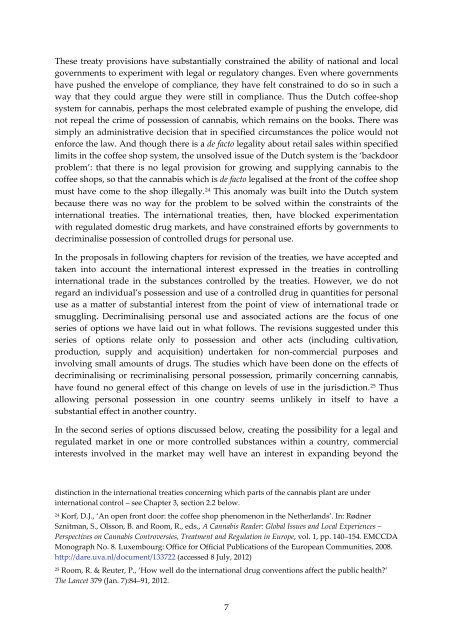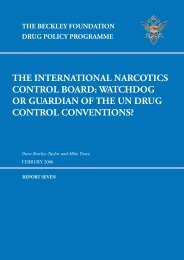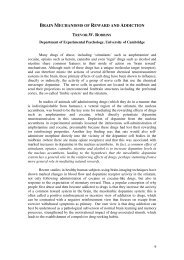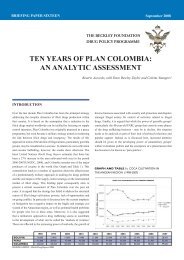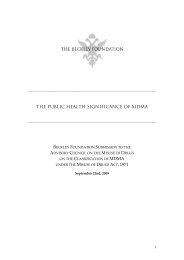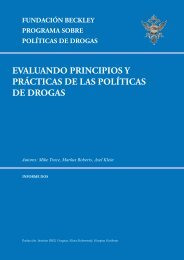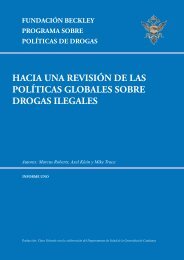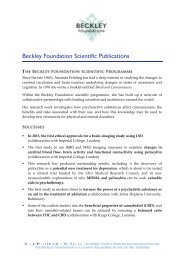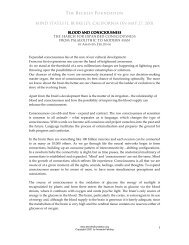roadmaps to reforming the un drug conventions - Beckley Foundation
roadmaps to reforming the un drug conventions - Beckley Foundation
roadmaps to reforming the un drug conventions - Beckley Foundation
You also want an ePaper? Increase the reach of your titles
YUMPU automatically turns print PDFs into web optimized ePapers that Google loves.
These treaty provisions have substantially constrained <strong>the</strong> ability of national and localgovernments <strong>to</strong> experiment with legal or regula<strong>to</strong>ry changes. Even where governmentshave pushed <strong>the</strong> envelope of compliance, <strong>the</strong>y have felt constrained <strong>to</strong> do so in such away that <strong>the</strong>y could argue <strong>the</strong>y were still in compliance. Thus <strong>the</strong> Dutch coffee-shopsystem for cannabis, perhaps <strong>the</strong> most celebrated example of pushing <strong>the</strong> envelope, didnot repeal <strong>the</strong> crime of possession of cannabis, which remains on <strong>the</strong> books. There wassimply an administrative decision that in specified circumstances <strong>the</strong> police would notenforce <strong>the</strong> law. And though <strong>the</strong>re is a de fac<strong>to</strong> legality about retail sales within specifiedlimits in <strong>the</strong> coffee shop system, <strong>the</strong> <strong>un</strong>solved issue of <strong>the</strong> Dutch system is <strong>the</strong> ‘backdoorproblem’: that <strong>the</strong>re is no legal provision for growing and supplying cannabis <strong>to</strong> <strong>the</strong>coffee shops, so that <strong>the</strong> cannabis which is de fac<strong>to</strong> legalised at <strong>the</strong> front of <strong>the</strong> coffee shopmust have come <strong>to</strong> <strong>the</strong> shop illegally. 24 This anomaly was built in<strong>to</strong> <strong>the</strong> Dutch systembecause <strong>the</strong>re was no way for <strong>the</strong> problem <strong>to</strong> be solved within <strong>the</strong> constraints of <strong>the</strong>international treaties. The international treaties, <strong>the</strong>n, have blocked experimentationwith regulated domestic <strong>drug</strong> markets, and have constrained efforts by governments <strong>to</strong>decriminalise possession of controlled <strong>drug</strong>s for personal use.In <strong>the</strong> proposals in following chapters for revision of <strong>the</strong> treaties, we have accepted andtaken in<strong>to</strong> acco<strong>un</strong>t <strong>the</strong> international interest expressed in <strong>the</strong> treaties in controllinginternational trade in <strong>the</strong> substances controlled by <strong>the</strong> treaties. However, we do notregard an individual’s possession and use of a controlled <strong>drug</strong> in quantities for personaluse as a matter of substantial interest from <strong>the</strong> point of view of international trade orsmuggling. Decriminalising personal use and associated actions are <strong>the</strong> focus of oneseries of options we have laid out in what follows. The revisions suggested <strong>un</strong>der thisseries of options relate only <strong>to</strong> possession and o<strong>the</strong>r acts (including cultivation,production, supply and acquisition) <strong>un</strong>dertaken for non-commercial purposes andinvolving small amo<strong>un</strong>ts of <strong>drug</strong>s. The studies which have been done on <strong>the</strong> effects ofdecriminalising or recriminalising personal possession, primarily concerning cannabis,have fo<strong>un</strong>d no general effect of this change on levels of use in <strong>the</strong> jurisdiction. 25 Thusallowing personal possession in one co<strong>un</strong>try seems <strong>un</strong>likely in itself <strong>to</strong> have asubstantial effect in ano<strong>the</strong>r co<strong>un</strong>try.In <strong>the</strong> second series of options discussed below, creating <strong>the</strong> possibility for a legal andregulated market in one or more controlled substances within a co<strong>un</strong>try, commercialinterests involved in <strong>the</strong> market may well have an interest in expanding beyond <strong>the</strong>distinction in <strong>the</strong> international treaties concerning which parts of <strong>the</strong> cannabis plant are <strong>un</strong>derinternational control – see Chapter 3, section 2.2 below.24Korf, D.J., ‘An open front door: <strong>the</strong> coffee shop phenomenon in <strong>the</strong> Ne<strong>the</strong>rlands’. In: RødnerSznitman, S., Olsson, B. and Room, R., eds., A Cannabis Reader: Global Issues and Local Experiences –Perspectives on Cannabis Controversies, Treatment and Regulation in Europe, vol. 1, pp. 140–154. EMCCDAMonograph No. 8. Luxembourg: Office for Official Publications of <strong>the</strong> European Comm<strong>un</strong>ities, 2008.http://dare.uva.nl/document/133722 (accessed 8 July, 2012)25Room, R. & Reuter, P., ‘How well do <strong>the</strong> international <strong>drug</strong> <strong>conventions</strong> affect <strong>the</strong> public health?’The Lancet 379 (Jan. 7):84–91, 2012.7


